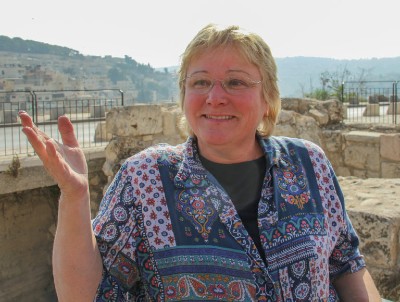Remembering Eilat Mazar
Queen of Jerusalem Archaeology
By Megan Sauter | May 26, 2021
 Archaeologist Eilat Mazar, whose many discoveries related to biblical Jerusalem regularly appeared in the pages of BAR. Photo courtesy Alexander Schick.
Archaeologist Eilat Mazar, whose many discoveries related to biblical Jerusalem regularly appeared in the pages of BAR. Photo courtesy Alexander Schick.Dr. Eilat Mazar (1956–2021), who passed away on May 25, 2021, was archaeology royalty. Her grandfather, Benjamin Mazar, directed excavations at Beth Shearim, Tell Qasile, and, most notably, Jerusalem. He served as Professor of Biblical History and Archaeology at the Hebrew University of Jerusalem for decades – and even became president of the university. Her cousin, Amihai Mazar, also pursued archaeology at the Hebrew University and most recently directed excavations at Tel Rehov.
Eilat’s first experience with archaeology was working on one of her grandfather’s digs. Later, she joined the team of Yigal Shiloh’s excavations in the City of David, where she was quickly promoted to supervise her own area. She studied archaeology at the Hebrew University, where she focused on Phoenician culture, notably excavating the site of Achziv along the northern coast of Israel.
While she made significant contributions to understanding the Phoenicians, Eilat Mazar became a household name when she returned to dig in Jerusalem with her grandfather. Following further in her grandfather’s footsteps, she joined the faculty of the Hebrew University. She later directed her own excavations in the City of David and uncovered the possible remains of King David’s palace, and the bullae (seal impressions) of two royal officials, Jehucal and Gedaliah, who the Bible says were hostile to the prophet Jeremiah (Jeremiah 38:1). She also dug at the Ophel, at the base of the Temple Mount, where she uncovered bullae of King Hezekiah and the prophet Isaiah. Most recently, she published a volume, Over the Crossroads of Time: Jerusalem’s Temple Mount Monumental Staircases, that reanalyzed her grandfather’s excavations and argued that the grand staircase leading to the Temple Mount, whose foundations he had uncovered, was much grander than originally thought. As she discovered, it was likely a four-way monumental stairway that was gradually completed during the opening decades of the first century C.E.
In addition to her prowess as an archaeologist, Eilat was kind and gracious. Eilat leaves behind three sons and a daughter. She will be missed by family, friends, and the archaeology community, alike. May her memory be for a blessing!
This article originally appeared here.